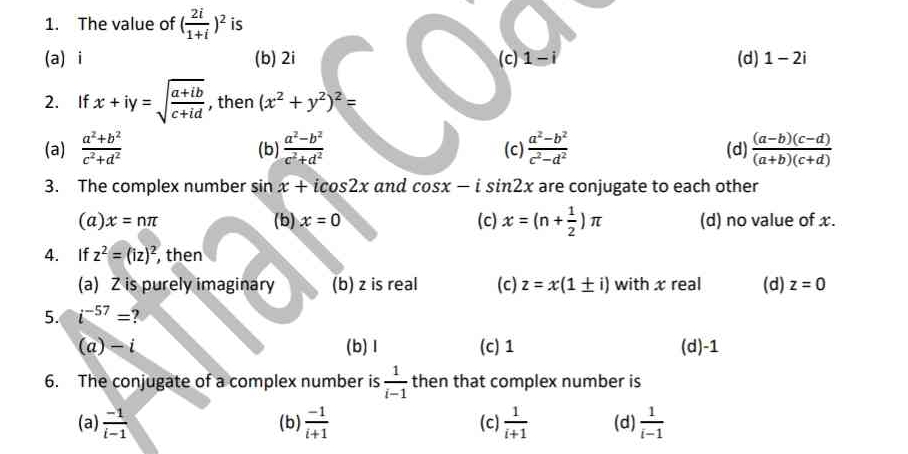Complex number problems

Understand the Problem
The image presents a series of multiple-choice questions related to complex numbers. These questions test the understanding of various concepts, including:
- Evaluating expressions with complex numbers.
- Relating the real and imaginary parts of complex numbers.
- Properties of conjugate complex numbers.
- Solving equations involving complex numbers.
- Powers of the imaginary unit 'i'.
- Finding a complex number when its conjugate is given.
We will categorize this as math.
Answer
1. $2i$ 2. $\frac{a^2+b^2}{c^2+d^2}$ 3. no value of x. 4. $z = 0$ 5. $-i$ 6. $\frac{-1}{i+1}$
Answer for screen readers
- (b) $2i$
- (a) $\frac{a^2+b^2}{c^2+d^2}$
- (d) no value of x.
- (d) z = 0
- (a) -i
- (b) $\frac{-1}{i+1}$
Steps to Solve
- Evaluate $(\frac{2i}{1+i})^2$
First, simplify the fraction $\frac{2i}{1+i}$ by multiplying the numerator and denominator by the conjugate of the denominator, which is $1-i$.
$$ \frac{2i}{1+i} \cdot \frac{1-i}{1-i} = \frac{2i(1-i)}{(1+i)(1-i)} $$
Expand the numerator and denominator:
$$ \frac{2i - 2i^2}{1 - i^2} $$
Since $i^2 = -1$, substitute $-1$ for $i^2$:
$$ \frac{2i - 2(-1)}{1 - (-1)} = \frac{2i + 2}{2} = 1 + i $$
Now, square the result:
$$ (1+i)^2 = (1+i)(1+i) = 1 + 2i + i^2 = 1 + 2i - 1 = 2i $$
- Simplify $(x^2 + y^2)^2$ given $x + iy = \sqrt{\frac{a+ib}{c+id}}$
Given $x + iy = \sqrt{\frac{a+ib}{c+id}}$, find an expression for $x^2 + y^2$. Remember that $|x+iy| = \sqrt{x^2 + y^2}$.
Taking the magnitude of both sides:
$|x + iy| = \left| \sqrt{\frac{a+ib}{c+id}} \right|$ $\sqrt{x^2 + y^2} = \sqrt{\left| \frac{a+ib}{c+id} \right|}$ $\sqrt{x^2 + y^2} = \sqrt{\frac{|a+ib|}{|c+id|}}$ $\sqrt{x^2 + y^2} = \sqrt{\frac{\sqrt{a^2 + b^2}}{\sqrt{c^2 + d^2}}}$ Square both sides: $x^2 + y^2 = \frac{\sqrt{a^2 + b^2}}{\sqrt{c^2 + d^2}}$ Square both sides again: $(x^2 + y^2)^2 = \left(\frac{\sqrt{a^2 + b^2}}{\sqrt{c^2 + d^2}}\right)^2 = \frac{a^2 + b^2}{c^2 + d^2}$
- Find $x$ such that $sin x + icos2x$ and $cosx - i sin2x$ are conjugates
For two complex numbers to be conjugates, their real parts must be equal, and their imaginary parts must be the negative of each other. Thus:
$sin x = cos x$ and $cos 2x = sin 2x$ From $sin x = cos x$, we get $tan x = 1$, so $x = n\pi + \frac{\pi}{4}$, where $n$ is an integer. From $cos 2x = sin 2x$, we get $tan 2x = 1$, so $2x = m\pi + \frac{\pi}{4}$, where $m$ is an integer. Thus $x = \frac{m\pi}{2} + \frac{\pi}{8}$. Let's test $x = (n + \frac{1}{2})\pi$, $sin((n + \frac{1}{2})\pi) = cos(2(n+1/2)\pi) = cos((2n+1)\pi) = -1$, however $cos((n + \frac{1}{2})\pi) = 0$, so option (c) is false. Let's check if there is any value of $x$ where $sin x = cos x$ and $cos 2x = sin 2x$, this should equal $tan x = 1$, $x = n\pi + \frac{\pi}{4}$, and $tan 2x = 1$, $2x = m\pi + \frac{\pi}{4}$, dividing by 2 we get $x = \frac{m\pi}{2} + \frac{\pi}{8}$. Since we cannot find a common value of $x$, the answer is that no value of x is possible.
- Solve $z^2 = (iz)^2$
Given $z^2 = (iz)^2$, we need to find the condition for $z$.
$z^2 = i^2 z^2$ $z^2 = -z^2$ $2z^2 = 0$ $z^2 = 0$ $z = 0$
- Evaluate $i^{-57}$
Recall that $i^2 = -1$, $i^3 = -i$, $i^4 = 1$. We can write $i^{-57}$ as $\frac{1}{i^{57}}$. Divide 57 by 4: $57 = 4 \cdot 14 + 1$. So, $i^{57} = i^{4 \cdot 14 + 1} = (i^4)^{14} \cdot i^1 = (1)^{14} \cdot i = i$. Therefore, $i^{-57} = \frac{1}{i}$. Multiply numerator and denominator by $-i$: $\frac{1}{i} \cdot \frac{-i}{-i} = \frac{-i}{-i^2} = \frac{-i}{-(-1)} = \frac{-i}{1} = -i$.
- Find the complex number given its conjugate is $\frac{1}{i-1}$
Let $z$ be the complex number. The conjugate of $z$, denoted as $\bar{z}$, is given as $\frac{1}{i-1}$. Then $z$ is the conjugate of $\frac{1}{i-1}$. $z = \overline{(\frac{1}{i-1})} = \frac{1}{\overline{i-1}} = \frac{1}{-i-1} = \frac{1}{-(i+1)} = \frac{-1}{i+1}$
- (b) $2i$
- (a) $\frac{a^2+b^2}{c^2+d^2}$
- (d) no value of x.
- (d) z = 0
- (a) -i
- (b) $\frac{-1}{i+1}$
More Information
Complex number questions require a solid understanding of the properties of imaginary numbers and conjugates. Remembering that $i^2 = -1$ is fundamental, as is the method of multiplying by the conjugate to rationalize complex denominators.
Tips
- When simplifying expressions with complex numbers, forgetting that $i^2 = -1$ is a common mistake.
- When dealing with conjugates, incorrectly changing the sign only on the imaginary part.
- Forgetting to consider all solutions or cases when solving equations involving complex numbers.
- Making errors in basic arithmetic when manipulating complex numbers.
AI-generated content may contain errors. Please verify critical information